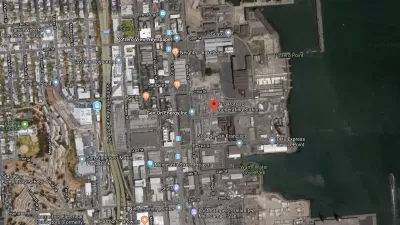By an 8-3 vote at 1:35 AM, July 14, the San Francisco Board of Supervisors approved a plan to add 10,500 homes (32% affordable) on a 720-acre brownfield site known as Hunters Point, a former shipyard, including 320 acres of parkland and open space.
The Hunters Point U.S. naval shipyard, a federally designated Superfund site contaminated by toxic waste, has been the subject of redevelopment plans for 20 years. The Environmental Impact Report for the project proposed by Lennar Urban was certified, allowing the project to go forward despite objections by environmentalists and community activists.
Amendments were added to "boost board oversight of the Yosemite Slough bridge design and of the cleanup of a particularly polluted project site, require funding of a local health center and of a job-training program for local residents" that will be voted on July 27, and a final vote will be required.
From Bay Citizen: SF Board Says 'Yes' to Lennar
After 10-hour hearing, environmental and health concerns don't carry the vote: "Environmental and community groups asked the board to reject the report because of two main concerns: a rush to develop the land before properly cleaning it up, and a bridge that would disturb the delicate tidal ecology in the area."
From San Francisco Chronicle Editorial: Time for San Francisco to remake Hunters Point: "If we do this, it's truly a historic moment," Mayor Gavin Newsom said in an interview Friday. "There's a generation of work culminating in one vote. For me, as I look back at the mayor's job, this is one of the most significant things I've been associated with."
FULL STORY: Hunters Point shipyard plan wins key approval

Alabama: Trump Terminates Settlements for Black Communities Harmed By Raw Sewage
Trump deemed the landmark civil rights agreement “illegal DEI and environmental justice policy.”

Planetizen Federal Action Tracker
A weekly monitor of how Trump’s orders and actions are impacting planners and planning in America.

Why Should We Subsidize Public Transportation?
Many public transit agencies face financial stress due to rising costs, declining fare revenue, and declining subsidies. Transit advocates must provide a strong business case for increasing public transit funding.

Understanding Road Diets
An explainer from Momentum highlights the advantages of reducing vehicle lanes in favor of more bike, transit, and pedestrian infrastructure.

New California Law Regulates Warehouse Pollution
A new law tightens building and emissions regulations for large distribution warehouses to mitigate air pollution and traffic in surrounding communities.

Phoenix Announces Opening Date for Light Rail Extension
The South Central extension will connect South Phoenix to downtown and other major hubs starting on June 7.
Urban Design for Planners 1: Software Tools
This six-course series explores essential urban design concepts using open source software and equips planners with the tools they need to participate fully in the urban design process.
Planning for Universal Design
Learn the tools for implementing Universal Design in planning regulations.
Caltrans
Smith Gee Studio
Institute for Housing and Urban Development Studies (IHS)
City of Grandview
Harvard GSD Executive Education
Toledo-Lucas County Plan Commissions
Salt Lake City
NYU Wagner Graduate School of Public Service





























